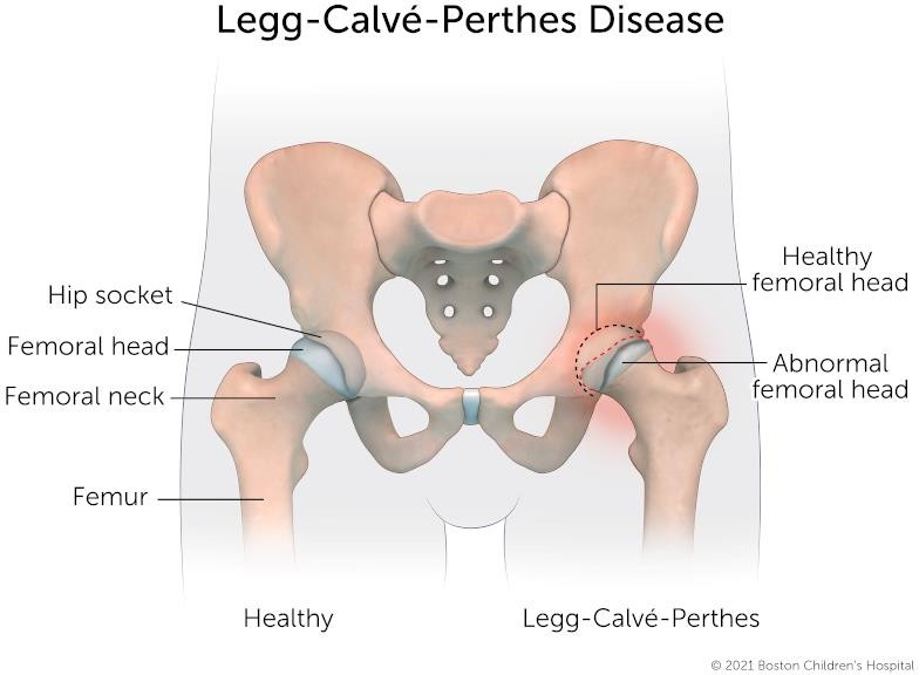Which factor is important to include in the teaching plan for parents of a child with Legg- Calve-Perthes disease?
It is an acute illness lasting 1 to 2 weeks.
There is a disturbance in the blood supply to the femoral epiphysis.
It is caused by a virus.
It affects primarily adults.
The Correct Answer is B
Legg-Calve-Perthes disease, also known as Perthes disease, is a childhood condition that affects the hip joint. It occurs due to a disruption in the blood supply to the femoral head (epiphysis), which can lead to bone death (avascular necrosis) and subsequent deformity of the femoral head.
It is essential for parents to understand that Legg-Calve-Perthes disease is not an acute illness that lasts for a short duration (Option A). It is a chronic condition that typically progresses over a period of months or years.
stating that it is caused by a virus, in (option C) is incorrect. The exact cause of Legg-Calve- Perthes disease is not fully understood, but it is not caused by a viral infection. It is believed to be related to multifactorial factors, including genetic and vascular factors.
stating that it primarily affects adults, in (option D) is incorrect. Legg-Calve-Perthes disease predominantly affects children, typically between the ages of 4 and 8 years old, during the period of rapid growth.

Nursing Test Bank
Naxlex Comprehensive Predictor Exams
Related Questions
Correct Answer is A
Explanation
The most appropriate statement by the nurse to a 15-year-old whose friend has mentioned suicide is option A. The statement acknowledges the seriousness of the situation and emphasizes the importance of taking the friend's threat seriously. It also highlights the need for immediate help and intervention. Suicide threats should never be dismissed or taken lightly, and it is crucial to involve professionals who can provide appropriate support and assistance.
"Tell your friend to come to the clinic immediately," in option B is incorrect because places the responsibility solely on the 15-year-old to relay the message to their friend, which may not be the most effective or timely approach.
"If your friend mentions suicide again, get your friend some help," in (option C) is incorrect because it does not address the urgency of the situation. Waiting for the friend to mention suicide again before acting may lead to potential harm.
"You need to gather details about your friend's suicide plan," is incorrect because places the responsibility on the 15-year-old to gather information about the friend's suicidal intentions. While understanding the situation and obtaining relevant details is important, the immediate priority is ensuring the friend's safety and seeking professional help.
Correct Answer is A
Explanation
The nurse's best response to the parents of a 10-year-old child newly diagnosed with type 1
diabetes mellitus, who are concerned about the child's continued participation in soccer, is to
reassure them that it is generally safe for the child to play sports such as soccer unless the
weather is too hot.
Regular physical activity, including participation in sports, is generally encouraged for
children with type 1 diabetes as long as certain precautions are taken. It is important for the
child to have a well-managed diabetes management plan in place, which may include
monitoring blood sugar levels before, during, and after physical activity, adjusting insulin
doses as necessary, and having appropriate snacks available to maintain blood sugar levels.
Option B, suggesting the swim team as an alternative to soccer, may be a viable option if the
child or parents prefer swimming or if the child has specific concerns related to soccer.
However, it is not the best response to the parents' concern about the child's continued
participation in soccer.
Option C, recommending an extra carbohydrate snack before soccer practice, is a valid
suggestion to help maintain the child's blood sugar levels during physical activity. However,
it should be part of a comprehensive diabetes management plan and not the sole response to
the parents' concern.
Option D, encouraging intellectual activity rather than participation in sports, is not
appropriate as physical activity is generally beneficial for children with type 1 diabetes, as
long as appropriate precautions are taken.
Whether you are a student looking to ace your exams or a practicing nurse seeking to enhance your expertise , our nursing education contents will empower you with the confidence and competence to make a difference in the lives of patients and become a respected leader in the healthcare field.
Visit Naxlex, invest in your future and unlock endless possibilities with our unparalleled nursing education contents today
Report Wrong Answer on the Current Question
Do you disagree with the answer? If yes, what is your expected answer? Explain.
Kindly be descriptive with the issue you are facing.
